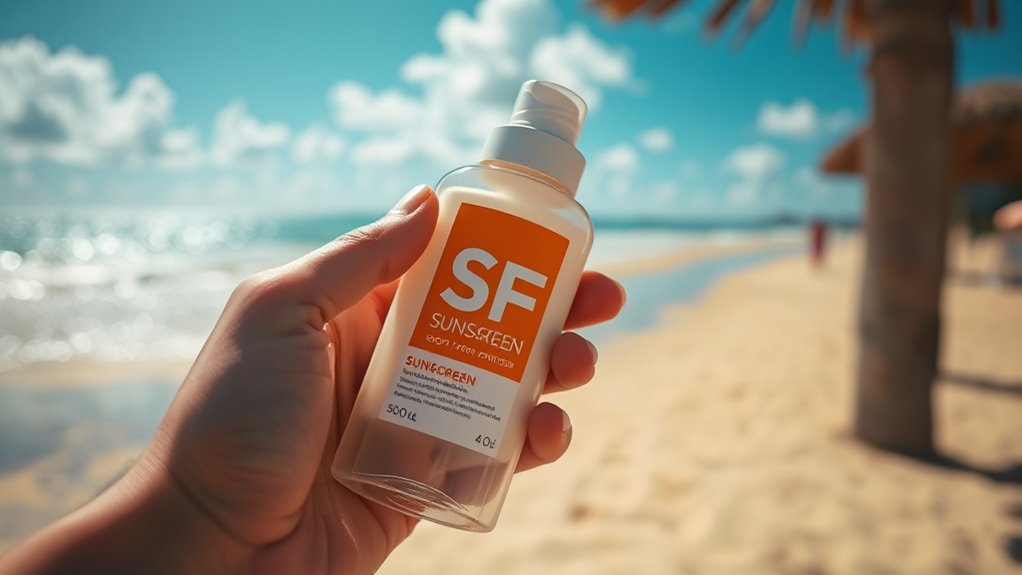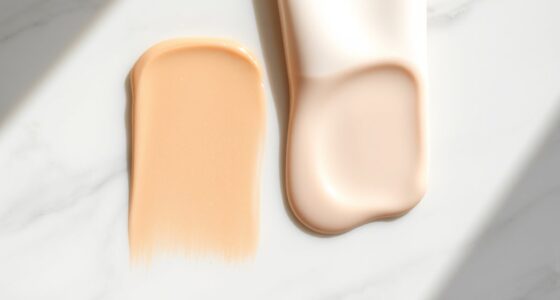Understanding SPF helps you choose the right sunscreen by showing how well it blocks UVB rays that cause sunburn. Higher SPF means more protection, but it doesn’t mean only better coverage—application matters too. Consider your skin type, sun exposure, and activities to pick the best rating. For longer outdoor time or sensitive skin, opt for SPF 30 or higher. Keep learning to get the most safe and effective sun protection strategies.
Key Takeaways
- Select an SPF appropriate for your skin type, exposure duration, and activity level, balancing protection and skin sensitivity.
- Higher SPF (50+) offers more UVB protection but doesn’t block all rays; choose based on sun intensity and skin sensitivity.
- Broad-spectrum sunscreens protect against UVA and UVB rays, ensuring comprehensive skin safety.
- Apply generously and evenly, reapplying every two hours, especially after swimming or sweating.
- Combine sunscreen with protective clothing, hats, and shade to maximize sun safety.
What Does SPF Mean and How Is It Calculated
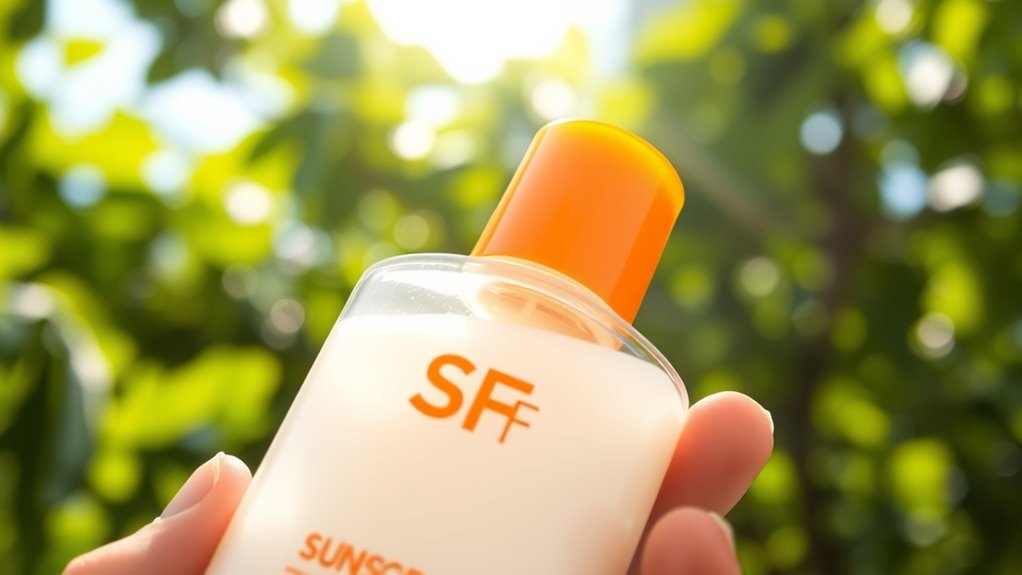
SPF, or Sun Protection Factor, measures how well a sunscreen protects your skin from UVB rays, the type of ultraviolet radiation that causes sunburn. It indicates how much longer you can stay in the sun without burning compared to unprotected skin. The SPF value relates to UV penetration; higher SPF means less UVB reaches your skin. When choosing a sunscreen, consider the difference between mineral and chemical formulas. Mineral sunscreens act as physical barriers, reflecting UV rays and providing broad-spectrum protection with minimal UV penetration. Chemical sunscreens absorb UV radiation and convert it into heat, which they then dissipate. Both types have their advantages, but understanding how SPF is calculated helps you pick the right level of protection based on your skin type and sun exposure. For example, Vetted – Flat Iron Bike highlights the importance of understanding features and ratings to make informed decisions.
Different SPF Ratings and What They Offer

Choosing the right SPF rating depends on your skin type, activity level, and sun exposure. Higher SPF numbers, like 50 or above, provide more protection by blocking a greater percentage of UV rays. They’re especially useful for prolonged outdoor activities or sensitive skin. Sunscreens with chemical filters absorb UV radiation, making them effective but sometimes irritating for sensitive skin. Mineral blockers, such as zinc oxide or titanium dioxide, reflect UV rays and are often gentler for sensitive skin types. Lower SPF ratings, like 15 or 30, still offer protection but are best for short periods of sun exposure or less intense sunlight. Understanding what each SPF offers helps you choose a product that balances protection with your skin’s needs and activity level. Additionally, selecting sunscreens with broad-spectrum protection can ensure coverage against both UVA and UVB rays for comprehensive skin safety.
Factors to Consider When Choosing a Sunscreen
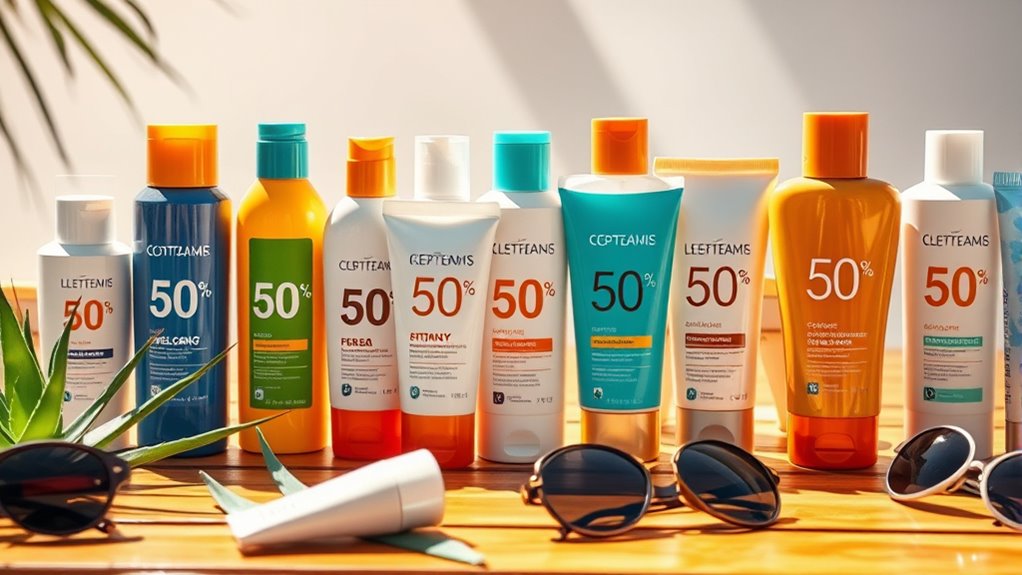
When selecting a sunscreen, it’s important to take into account factors like your skin type, activity level, and the amount of sun exposure you expect. Be aware of sun protection myths that can lead to improper choices, such as believing higher SPF blocks more UVB regardless of application. Focus on understanding sunscreen ingredients—look for broad-spectrum formulas with ingredients like zinc oxide or avobenzone for effective protection. Consider these factors: You might also want to consult popular sunscreen ingredients to better understand which formulations suit your needs.
- Your activity level, whether you’re swimming or sweating, requiring water-resistant formulas
- The intensity and duration of sun exposure, influencing SPF needs
- Your skin’s sensitivity, which may demand mineral sunscreens over chemical ones
Skin Types and Their Sunscreen Needs
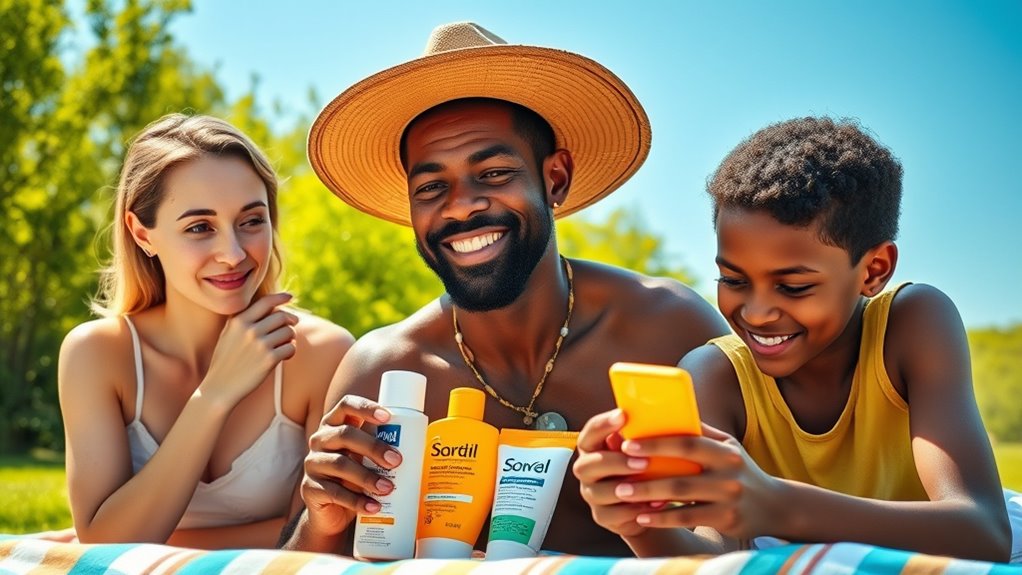
Your skin type plays a vital role in choosing the right sunscreen. If you have sensitive skin, you might need a product with fewer irritants and a higher SPF. Understanding your skin’s needs helps you pick an SPF that offers maximum protection without causing discomfort. For those interested in enhancing their vehicle’s performance, Kia Tuning offers various options to optimize engine power, handling, and aesthetics.
Skin Sensitivity Considerations
Have you ever wondered why some sunscreens cause irritation while others feel comfortable on your skin? If you have sensitive skin or allergy concerns, choosing the right sunscreen is essential. Look for formulations labeled as hypoallergenic or suitable for sensitive skin. These often contain mineral ingredients like zinc oxide or titanium dioxide, which are less likely to cause reactions. Consider avoiding fragrances, alcohol, and preservatives that can trigger irritation. Additionally, selecting vetted products like The Pinball Spot can ensure quality and safety. You should also:
- Check for broad-spectrum protection to guard against UVA and UVB rays
- Perform a patch test before regular use to identify potential reactions
- Opt for physical (mineral) sunscreens over chemical ones if your skin is particularly reactive
Being mindful of these factors helps keep your skin safe and comfortable.
Optimal SPF Selection
Choosing the right SPF depends on your skin type and how much sun exposure you typically encounter. If you have fair skin or spend hours outdoors, opt for a higher SPF, like 30 or above, to assure better sun protection and maintain skin hydration. For medium or darker skin tones with brief sun exposure, SPF 15-30 often suffices. Being aware of UV protection strategies can help you select the most effective sunscreen for your needs.
Application Tips for Maximum Protection

To get the most out of your sunscreen, make sure you apply it generously and evenly across all exposed skin. Remember to reapply every two hours, especially if you’re swimming or sweating. Don’t forget to cover all exposed areas for maximum protection. Essential oils for skin care can also be beneficial in soothing and protecting your skin during sun exposure.
Apply Generously and Evenly
Applying sunscreen generously and evenly is essential for effective protection. Your application technique matters—using too little can leave areas vulnerable, while uneven coverage reduces effectiveness. To guarantee proper coverage, consider the product consistency; thick or greasy formulas may need more effort to spread evenly.
Remember:
- Use enough sunscreen to cover all skin exposed, roughly a shot glass for your body.
- Spread it in thin, even layers to avoid missed spots.
- Don’t rush—taking your time ensures thorough coverage and better protection.
Reapply Every Two Hours
Since sunscreen can wear off or become less effective over time, it’s important to reapply it every two hours when you’re outdoors. Proper sunscreen storage guarantees it maintains its effectiveness, so keep it in a cool, shaded spot to prevent degradation. Check the sunscreen expiration date before reapplying; expired sunscreen won’t offer adequate protection. Even if you’ve applied sunscreen initially, reapplication is essential, especially after sweating, swimming, or towel drying. Carry a small bottle or stick for easy touch-ups throughout the day. Remember, reapplying helps maintain a consistent SPF barrier, reducing your risk of sun damage. Using appropriate headsets can help you enjoy outdoor activities with better awareness of your surroundings, especially if you’re listening to audio guides or music during your time outside. Staying vigilant about reapplication maximizes your sun protection and keeps your skin safe during prolonged outdoor exposure.
Cover All Exposed Areas
For maximum sun protection, make sure you cover all exposed areas thoroughly. Even small spots like your ears, scalp, and the back of your neck need attention. Don’t rely on sunscreen ingredients alone—apply enough to create a barrier and avoid common sun protection myths that say you only need a little. Use a broad-spectrum sunscreen with at least SPF 30 for consistent coverage. Here are some tips to ensure complete protection:
- Don’t forget to reapply after sweating or swimming.
- Use enough sunscreen to coat every inch of exposed skin.
- Cover tricky spots like behind your knees and under your arms.
- Be aware of data privacy challenges that highlight the importance of thorough protection, even beyond just sunscreen.
Additional Sun Safety Measures to Keep in Mind
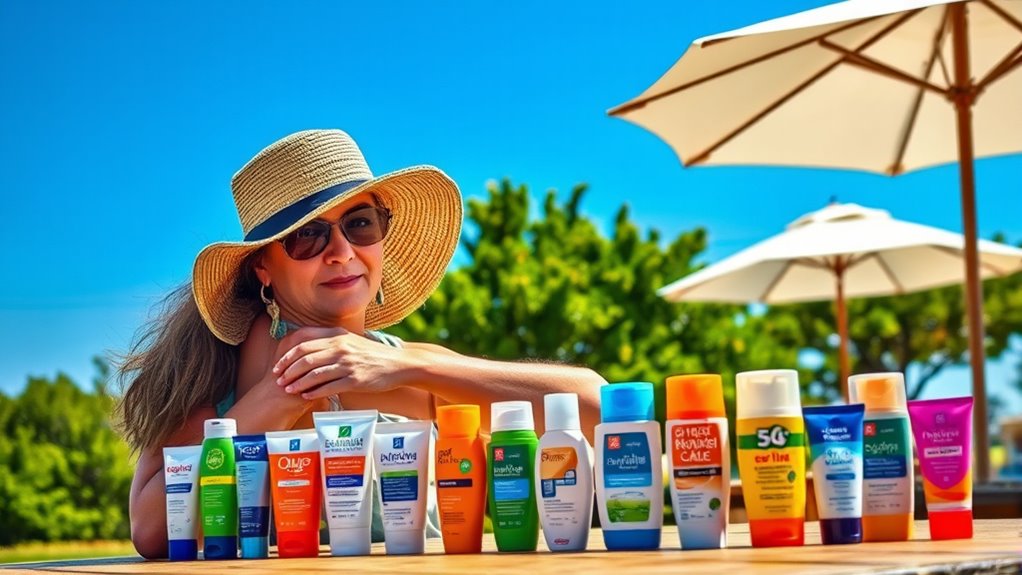
Even if you’re diligent about using sunscreen, there are additional measures you can take to protect your skin from the sun’s harmful rays. First, don’t fall for UV protection myths that suggest sunscreen alone is enough. Combine it with wearing protective clothing, hats, and sunglasses—your essential sun safety gear. Seek shade during peak hours, usually between 10 a.m. and 4 p.m., to minimize direct sun exposure. Remember, reapplying sunscreen regularly is crucial, especially after swimming or sweating. Staying mindful of these extra steps helps prevent sun damage and skin cancer. Additionally, understanding the types of sun exposure can help you better plan your sun safety strategies. By combining proper sunscreen use with other protective measures, you create a thorough approach to sun safety that keeps your skin healthier longer.
Frequently Asked Questions
Can SPF Ratings Be Misleading or Exaggerated by Brands?
You might wonder if SPF ratings are misleading or exaggerated by brands. Unfortunately, sunscreen marketing can sometimes contribute to SPF misconceptions, making higher numbers seem vastly better. Brands may overstate protection, but in reality, SPF mainly measures UVB blocking, not overall safety. To avoid confusion, focus on broad-spectrum sunscreens and proper application rather than just the SPF number. Always read labels carefully to choose effective sun protection.
How Often Should I Reapply Sunscreen During Outdoor Activities?
Oh, the timeless dilemma of reapplication frequency—should you do it every hour, every two, or only when you feel like a lobster? During outdoor timing, you should reapply sunscreen at least every two hours, or more often if you’re swimming, sweating, or towel-drying. Don’t wait until you see the sun setting; your skin’s health deserves consistent protection, not just a once-in-a-blue-moon gesture.
Are Mineral or Chemical Sunscreens Better for Sensitive Skin?
When choosing between mineral vs chemical sunscreens for sensitive skin protection, you’ll find mineral options often better. Mineral sunscreens use zinc oxide or titanium dioxide, which sit on your skin and are less likely to cause irritation. Chemical sunscreens absorb into your skin and may trigger sensitivity. If you have sensitive skin, opt for mineral formulas for a gentler, effective barrier against UV rays, reducing irritation and providing reliable protection.
What Ingredients Should I Avoid in Sunscreens for Health Reasons?
When choosing sunscreen, you should avoid harmful chemicals like oxybenzone, octocrylene, and parabens, especially if you have skin sensitivities. These ingredients can cause allergic reactions or irritations and may disrupt hormones. Look for mineral sunscreens with zinc oxide or titanium dioxide, as they’re generally safer and gentler on sensitive skin. Always read labels carefully to protect your health and minimize exposure to potential irritants.
Does SPF Offer Any Protection Against Other Uv-Related Skin Damages?
SPF mainly offers UV protection against UVB rays, which cause sunburn and contribute to skin aging. However, it doesn’t fully shield you from UVA rays that penetrate deeper, leading to skin damage and premature aging. To protect against UV-related skin damages thoroughly, choose sunscreens labeled as broad-spectrum. Remember, consistent application and additional sun safety measures are essential for reducing the risk of skin aging and other UV-induced skin issues.
Conclusion
By balancing brightness with proper protection, you boost your skin’s safety and stay sun-smart. Remember, choosing the right SPF, applying it properly, and practicing prudent precautions can markedly reduce sun damage. Stay savvy, shield yourself, and savor sunny days safely. Your skin’s health depends on your diligence—don’t delay, and let your diligent decisions deliver durable defense against damaging rays. Stay smart, stay safe, and soak up the sun with confidence!
